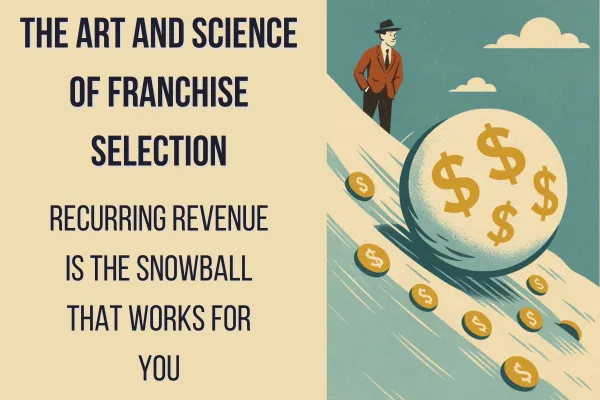
The Art and Science of Franchise Research: Recurring Revenue
Recurring Revenue
Recurring revenue businesses generate steady and predictable income by regularly charging their customers (typically monthly or annually). This structure makes recurring revenue businesses more predictable, safer, and often more valuable when sold.
Below, we’ll explain why recurring revenue is so valuable, the risks of not having recurring revenue, and how you can manage these risks effectively.
Why Recurring Revenue is Valuable:
Predictability & Stability:
Recurring revenue businesses let you accurately forecast future revenue because you typically know:
How long a customer stays (Customer Lifetime)
What it costs to acquire each new customer (Customer Acquisition Cost, CAC)
How much money each customer generates over their lifetime (Lifetime Value, LTV)
This predictability makes recurring revenue businesses highly attractive to buyers, often commanding higher valuations at sale.
Key Terms:
Customer Acquisition Cost (CAC): Average marketing cost to gain one new customer.
Customer Lifetime: Average time a customer continues purchasing from you.
Lifetime Value (LTV): Total revenue you make from a customer throughout their lifetime.
Churn: Percentage of customers who leave your service in a given period (usually monthly).
Recurring Revenue Allows You to Outspend Your Competition:
In a one-time-sale business, your CAC must be less than the immediate sale price. For example, if you sell a product once for $100, your CAC must be below $100 to make a profit.
However, in a recurring revenue business, you can afford to spend much more to acquire customers, even more than they pay you in the first month. If you charge $100 per month and your customers typically stay for two years, your LTV is $2,400. Now you can comfortably spend several hundred dollars on marketing per customer—far more than a business selling a product just once.
This extra spending capability allows you to:
Dominate advertising channels: Google and Facebook ads are auction-based, meaning companies that can pay more for customers win the best ad placements.
Grow faster: Attracting customers quicker and more aggressively than competitors who can't afford these upfront costs.
Example:
One-time widget business:
You sell widgets for $100 each, only once. Your CAC must remain below $100.
Recurring widget subscription:
You sell widgets at $100/month, and customers stay an average of 24 months (LTV = $2,400). You can easily spend $200-500 per customer in marketing. Your business will consistently outperform the single-sale competitor in acquiring new customers.
Increasing Customer Lifetime to Boost Revenue:
Recurring revenue businesses have an additional powerful way to boost revenue: extending customer lifetime.
Improving customer lifetime from 2 years to 2.5 years dramatically increases your revenue without additional marketing spending. To do this, you simply focus on:
Providing better and better service over time.
Increasing customer satisfaction and loyalty.
This means recurring revenue businesses have multiple paths to revenue growth—acquiring new customers AND improving retention through great service—giving you far more control over revenue than a one-time-sale business.
Recurring Revenue Makes Growth Easier:
Recurring revenue simplifies scaling your business because each sale continues to pay off month after month.
Example:
To reach revenue from 100 monthly sales:
One-time revenue: You must immediately hire 5 salespeople, each closing 20 new sales every single month.
Recurring revenue: You could hire just one salesperson who closes 20 sales each month. By month five, you’ll reach revenue from 100 active customers, assuming they stay at least five months.
If you hire more salespeople, recurring revenue dramatically accelerates growth because past sales continue contributing revenue every month.
Types of Recurring Revenue:
Recurring revenue varies in how secure it is:
Long-term Contracts (1+ year, Contractually Obligated):
Secure revenue usually from governments or businesses.
Requires strong sales and relationships.
Examples: City contracts, construction services.
Short-term Contracts (Months to 1 Year):
Contracts with businesses or consumers.
Requires good sales to overcome customer hesitation.
Examples: Dumpster rentals, gym memberships.
Month-to-month Payments:
Customers billed monthly, can cancel anytime.
Easier to sell; requires consistently high service quality or high switching costs.
Examples: Pest control, tutoring services.
Re-occurring Revenue (No auto-billing, but regular repeat sales):
Customers voluntarily return regularly.
Must consistently offer the best price, quality, or convenience.
Examples: Oil change shops, butcher shops.
Risks of Not Having Recurring Revenue:
Without recurring revenue, your business heavily depends on continual sales:
Marketing costs remain high, as each month requires new customer acquisition.
Losing key salespeople or marketers immediately impacts revenue.
Seasonal fluctuations drastically reduce revenue without guaranteed recurring payments.
Recurring revenue businesses soften these impacts because customers usually remain active—even during seasonal lows—thanks to the convenience or contracts involved.
How to Mitigate the Risks:
If your business doesn't have recurring revenue, you must carefully handle these risks:
1. Exceptional Marketing:
If your franchise doesn’t have recurring revenue, confirm they truly support your marketing efforts by validating with current franchisees:
Do they fully manage marketing campaigns or just provide materials?
Average leads per month?
Conversion rate from leads to paying customers?
(See detailed validation questions at app.tracerfranchising.com.)
2. Foot Traffic-Driven Businesses:
Careful location selection is crucial. Poor location choice or external disruptions (like road construction) can severely impact your business.
3. High-Ticket Sales:
Selling expensive, high-margin products can succeed without recurring revenue. Verify carefully:
Franchise ability to consistently generate qualified leads.
Skill level required for salespeople.
Difficulty of delivering the service.
Realistic CAC relative to the price point.
Conclusion:
Recurring revenue provides crucial advantages: predictability, the ability to invest heavily upfront to acquire customers, and easy growth through improved customer service and retention.
Without recurring revenue, your business depends heavily on excellent sales or marketing efforts. If recurring revenue isn't possible, carefully validate the franchise's marketing capabilities, location potential, or profitability of high-ticket items.
Ultimately, recurring revenue offers powerful advantages in business growth, valuation, and stability.
